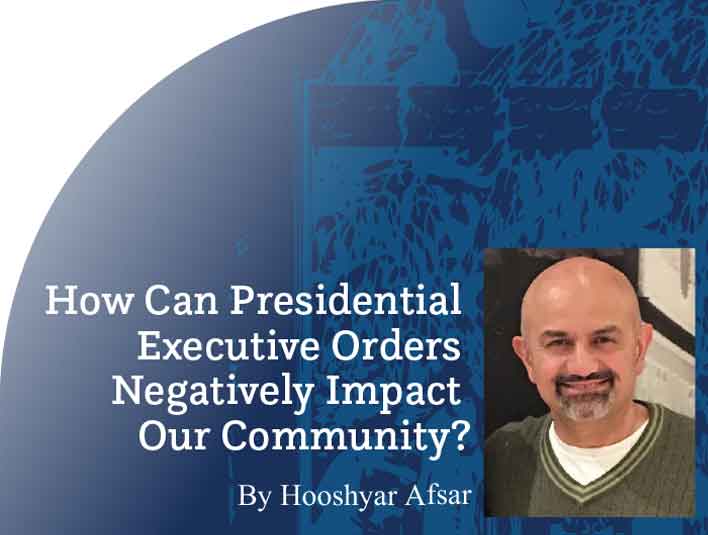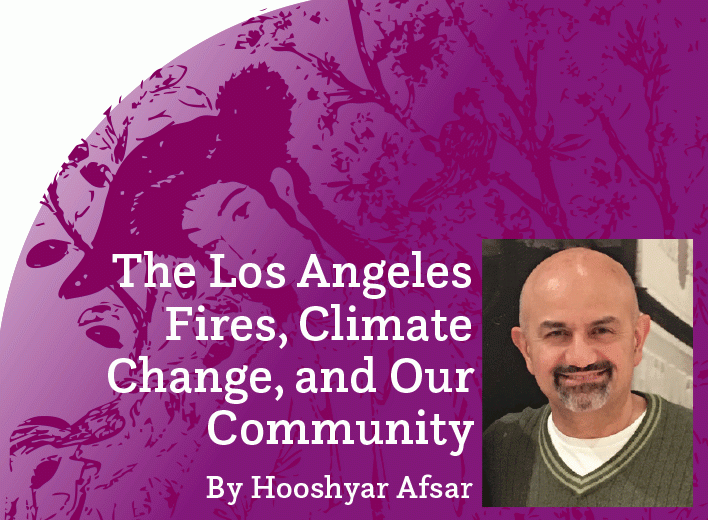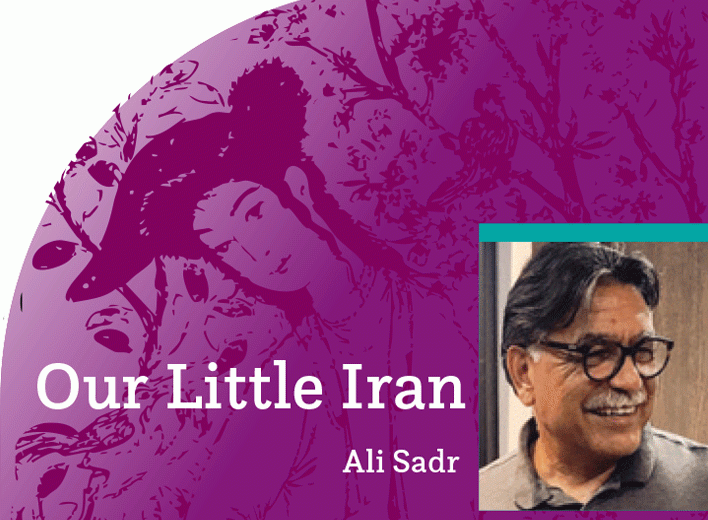How Can Presidential Executive Orders Negatively Impact Our Community?
Hooshyar Afsar
Introduction
9066 and 13769: What do these two numbers mean for the Iranian American community? At first glance, they are just two numbers, yet they embody historic executive orders that significantly impacted immigrant communities in the United States.
The first one, Executive Order 9066, also known as the Japanese Internment Executive Order, was signed by President Franklin Roosevelt (aka, FDR) on February 19, 1942. [1] The second one, Executive Order 13769, also known as the Muslim Ban, was signed by President Donald Trump on January 27, 2017. [2]
Japanese internment resulted in 120,000 people being confined in ten camps in five western states and Arkansas. Over 65% of the people who were rounded up and sent to camps were U.S. citizens, while many of the remaining percentage had lived in the United States for 20 to 40 years. [3]
While the “Muslim Ban” faced more challenges in the federal courts and went through two more iterations before being upheld by Supreme Court of the U.S. (SCOTUS) in June 2018, between December 2017 and President Biden’s inauguration in January 2021, the ban resulted in the rejection of over 58,000 visa applications from citizens of 13 countries. [4]
In this article, we shall examine these two executive orders and the possibility of the merger of the two underlying policy aims, resulting in serious restrictions on the lives of Iranian Americans and other Iranian nationals living in the U.S. after the 2024 presidential election.
What Are Executive Orders?
While the term “executive order” is not directly mentioned in Article II of the U.S. Constitution and its four sections, there is a general sentence in Clause 1 of Article II which states: “The executive Power shall be vested in a President of the United States of America” and then in the last sentence of Section 3 stating that the President “… shall take Care that the Laws be faithfully executed.”
Except for William Henry Harrison, who died of illness a month after his inauguration, all U.S. presidents have signed executive orders, beginning with George Washington in 1789. Numbers were assigned starting with Abraham Lincoln’s first executive order in 1861. The most famous executive order is the Emancipation Proclamation, the final version of which was issued on January 1, 1863, declaring free all persons “held as slaves” in the rebel states of the Confederacy.
Executive orders could be subject to constitutionality verification by the federal court system all the way to SCOTUS.
Japanese Internment
Curiously, Executive Order 9066 never mentions the term Japanese or Japanese American. In his past speeches on Japanese Americans and in support of segregationist laws in California, FDR had shown clear racial bias against Japanese Americans and all people of Japanese descent living in the United States. [5] So, the internment was a continuation of the racism and segregation policies towards Japanese Americans and other Asian peoples. [6]
Two cases were filed in federal courts after the issuance of EO 9066, challenging the constitutionality of the executive order. Both cases were brought by second-generation Japanese Americans—one by a Japanese American woman born in Sacramento, California, and one by a Japanese American man born in Oakland, California. SCOTUS ruled on both cases in December 1944, in a contradictory fashion. It ruled in favor of the woman in Ex Parte Endo, stating that the U.S. government could not continue to detain a citizen who was “concededly loyal” to the United States. [7] However, in the other case, Korematsu v. United States, SCOTUS ruled that the executive order had not violated citizens’ rights. [8]
Although FDR suspended EO 9066 after these two rulings and the camps were all eventually shut down in 1946, the damage was done. Over 100,000 people, including 80,000 American citizens, had lost their rights and all their possessions (including their homes and businesses) and were dehumanized by their own government.
Digging further into the demographics of those who were interned by EO 9066 sheds a light on possible future outcomes or consequences for our community and all immigrant communities in the United States. About 80,000 of the people incarcerated were American citizens—these were all second- and third-generation Japanese Americans born in the United States. [9] Up until the passage of the Immigration Act of 1952, Japanese nationals were barred from becoming American citizens based on the discriminatory Immigration Act of 1924. [10] This means that, in as recently as mid-twentieth century America, U.S. citizens born in the United States were not safe from losing all their rights and possessions under the excuse of a war between their country of citizenship, i.e., the United States, and a country of their ancestry. Many second- and third-generation Japanese Americans interned as a result of EO 9066 had never been to Japan.
An official commission formed during the Carter Administration concluded, in its report issued in December 1982, that the decision to incarcerate was based on “race prejudice, war hysteria, and a failure of political leadership.” [11] Ask yourself whether all those elements are either present today, or are very close to becoming a reality, with regards to Iranian Americans, and the governments of the United States and the Islamic Republic.
The “Muslim Ban” or “Iranian Ban”
The issuance of EO 13769 by the Trump administration on January 27, 2017—banning citizens of seven Muslim-majority countries to travel or migrate to the U.S.—resulted in significant confusion and chaos, plus demonstrations and gatherings at international airports across the United States. The confusion caused U.S. permanent residents (Green Card holders) and individuals with legal U.S. visas to be blocked from entry into the United States and even apprehended at airports with handcuffs and/or shackles. In all, more than 700 travelers were arrested and about 60,000 visas were revoked. [12]
The national outrage and confusion, plus court action by the ACLU and other groups, resulted in a federal court injunction blocking execution of the order; EO 13769 was then superseded by EO 13780, which merely dropped Iraq from the list of prohibited countries. [13] This second executive order was also blocked in federal courts, resulting in Presidential Proclamation 9645, which added North Korea and Venezuela to the list and dropped Sudan from the list. After traveling through the federal courts, SCOTUS finally ruled in favor of the government in a 5-4 decision in June 2018. [14]
Of the 58,000 visa applications from citizens of 13 countries that were denied under the above executive orders between December 2017 and January 2021, over 35,500 (78.2%) were for Iranian nationals. [15] There is a good reason that many justifiably call the “Muslim Ban” the “Iranian Ban.” Imagine all the hopes for a new life that were smashed and all family reunions that did not happen that added to the social trauma that our community worldwide has endured since a polarizing revolution, eight years of a horrific war with Iraq, repression, gender apartheid, and economic crisis. Will we ever be able to measure the destructive impact of 35,500 visas denied on our community in the U.S.? In a landmark keynote address at the Forty Years of Diaspora conference in California in March 2019, Professor Neda Maghbouleh spoke about the impact of her aunt’s visit from Iran on her life and shaping of her personality as an Iranian American. [16] How many young Nedas lost that chance forever?
Dehumanization of Iranian Americans and Misgivings in the Community
Dehumanization of the Iranian community in the United States is a serious matter. The fact is that openly racist and xenophobic attacks against Iranians have almost no political or legal consequences for politicians, mainstream media, and even filmmakers in the United States.
In addition to over 35,000 Iranians barred from traveling or immigrating to the United States, serious actions took place and continue to take place against Iranian Americans by the U.S. government, state governments, and public officials that are alarming. Such examples are: U.S. citizens held at the U.S.-Canadian border after the killing of Ghasem Soleymani in January 2020 [17]; forced closing of bank accounts of Iranian Americans [18]; Texas attempted legislation to ban Iranians from buying land and property [19]; a May 2023 Florida legislation signed into law by Governor Ron DeSantis banning Iranian students being hired as research assistants [20]; and outright racist and dehumanizing comments by U.S. Senators, Congresspeople, and other public officials about Iranians. [21]
There are a significant number of people in the Iranian American community who think that because we are U.S. citizens, we are immune from future persecution by our government similar to what happened to Japanese Americans during World War II. Many people of the same group advocate war or some sort of military action by the U.S. government to bring about “regime change” in Iran and specifically support the candidate whom they think is more likely to take that sort of action. Couldn’t a war between the U.S. government and Islamic Republic—in addition to its catastrophic consequences for the Iranian and American peoples—pave the way for an “Iranian Internment” here in the U.S.? How about many members of our community who are either Green Card holders, have other kinds of visas, or do not have legal status? Aren’t they also members of our community? Don’t we think it only makes sense to support their rights as human beings living in the United States?
What Could the Future Hold?
The mid-twentieth century internment of over 100,000 Japanese Americans plus the “Iranian Ban” that was in place until just over three years ago tell us that the 2024 presidential election could have serious consequences for our community.
The lessons of Japanese internment and the “Iranian Ban” are clear—we are just one signature away from losing our rights and possessions. As a community we need to act. Actions and preparations need to happen at both macro (community and society) and micro (family and individual) levels.
At the macro level, community unity regardless of political and religious beliefs or immigration status is of the essence. We need to use our community organizations to build a sense of unity and awareness. Utilizing national civil liberties entities such as the ACLU to educate our community members on how to defend and secure our rights are of utmost importance. At the societal/political level, we need to support policy initiatives and politicians who could help our community and secure our rights.
At the micro level, we need to talk to our neighbors and neighborhood organizations to create support structures for ourselves. Having a certain amount of cash handy in case our bank accounts are frozen may sound crazy to many, yet there is no harm in doing it. Families and individuals should be prepared to leave the country quickly before possible bans, sanctions, or detentions go into effect. If you are a U.S. citizen, make sure your American passport is valid for at least six months. All members of our community should try and have one or more valid passports, be it Iranian or other nationality passports (e.g., EU).
Ultimately, both at macro and micro levels, we need to prepare for the worst and hope for the best. Remember that life is short and having a sense of urgency and preparedness can never hurt. Waiting until November 5th, the election day, could be too late. We should come together as a community and create a sense of solidarity with all immigrant and progressive communities to defend and secure our basic human rights.
References
[1] – https://www.archives.gov/milestone-documents/executive-order-9066
[2]-https://trumpwhitehouse.archives.gov/presidential-actions/executive-order-protecting-nation-foreign-terrorist-entry-united-states-2/
[3]-Beito, David T., The New Deal’s War on the Bill of Rights: The Untold Story of FDR’s Concentration Camps, Censorship, and Mass Surveillance (First ed.). Oakland: Independent Institute (2023), pp. 165–173.
[4]-https://travel.state.gov/content/dam/visas/presidentialproclamation/PP-9645_Montly-Public-Reporting-January%202021.pdf
[5] – Beito, pp. 165–173.
[6] – https://www.pbs.org/newshour/nation/the-long-history-of-racism-against-asian-americans-in-the-u-s
[7] – https://www.loc.gov/item/usrep323283/
[8] – https://www.loc.gov/item/usrep323214/
[9] – Reeves, Richard, Infamy: The Shocking Story of the Japanese American Internment in World War II. New York: Henry Holt and Company (2016), p. xiii.
[10] – https://history.state.gov/milestones/1921-1936/immigration-act#:~:text=The%20Immigration%20Act%20of%201924%20limited%20the%20number%20of%20immigrants,of%20the%201890%20national%20census.
[11] – https://encyclopedia.densho.org/Commission_on_Wartime_Relocation_and_Internment_of_Civilians
[12]-https://www.npr.org/sections/thetwo-way/2017/02/03/513306413/state-department-says-fewer-than-60-000-visas-revoked-under-travel-order
[13] –https://www.dhs.gov/sites/default/files/publications/Executive%20Order%2013780%20Section%2011%20Report%20-%20Final.pdf
[14] – https://www.cnn.com/2018/06/26/politics/travel-ban-supreme-court/index.html
[15]-https://travel.state.gov/content/dam/visas/presidentialproclamation/PP-9645_Montly-Public-Reporting-January%202021.pdf
[16] – https://www.youtube.com/watch?v=M0LRua9omLU&t=48s
[17] – https://www.cnn.com/2020/02/04/politics/cbp-breach-protocol-iranian-americans/index.html
[18]-https://www.niacouncil.org/press_room/niac-presses-treasury-discriminatory-bank-account-closures/?locale=en
[19]-https://www.kut.org/politics/2023-04-25/texas-senate-oks-bill-banning-foreign-governments-including-china-from-buying-agricultural-land
[20] – https://www.nature.com/articles/d41586-024-00554-2; According to one of the Board members of Persian Cultural Center (PCC) of Atlanta, at least two Iranian graduate students who lost their assistantship in Florida and could not afford to continue their graduate studies in that state were seeking help to relocate to a Georgia-based university.
[21] – https://www.niacouncil.org/wp-content/uploads/2022/01/niac_2201_iapanelprep3-2.pdf, pp. 11-15

















